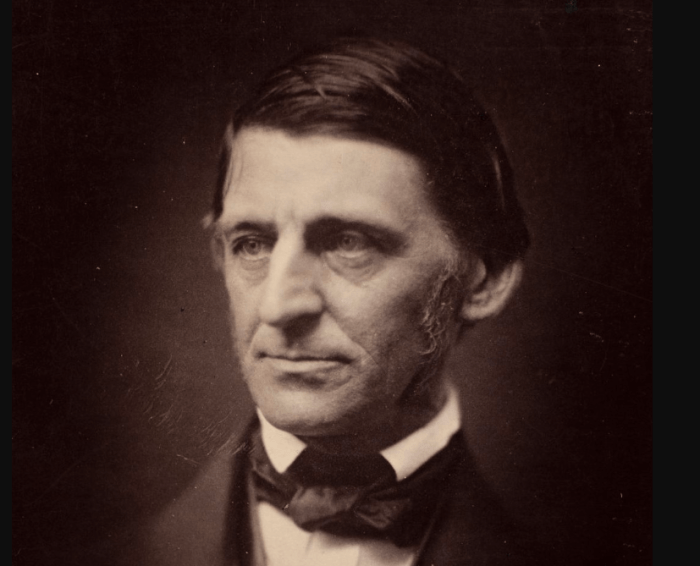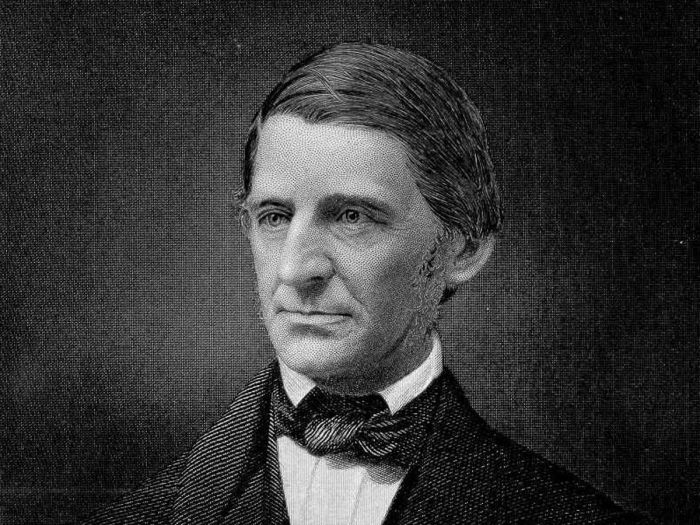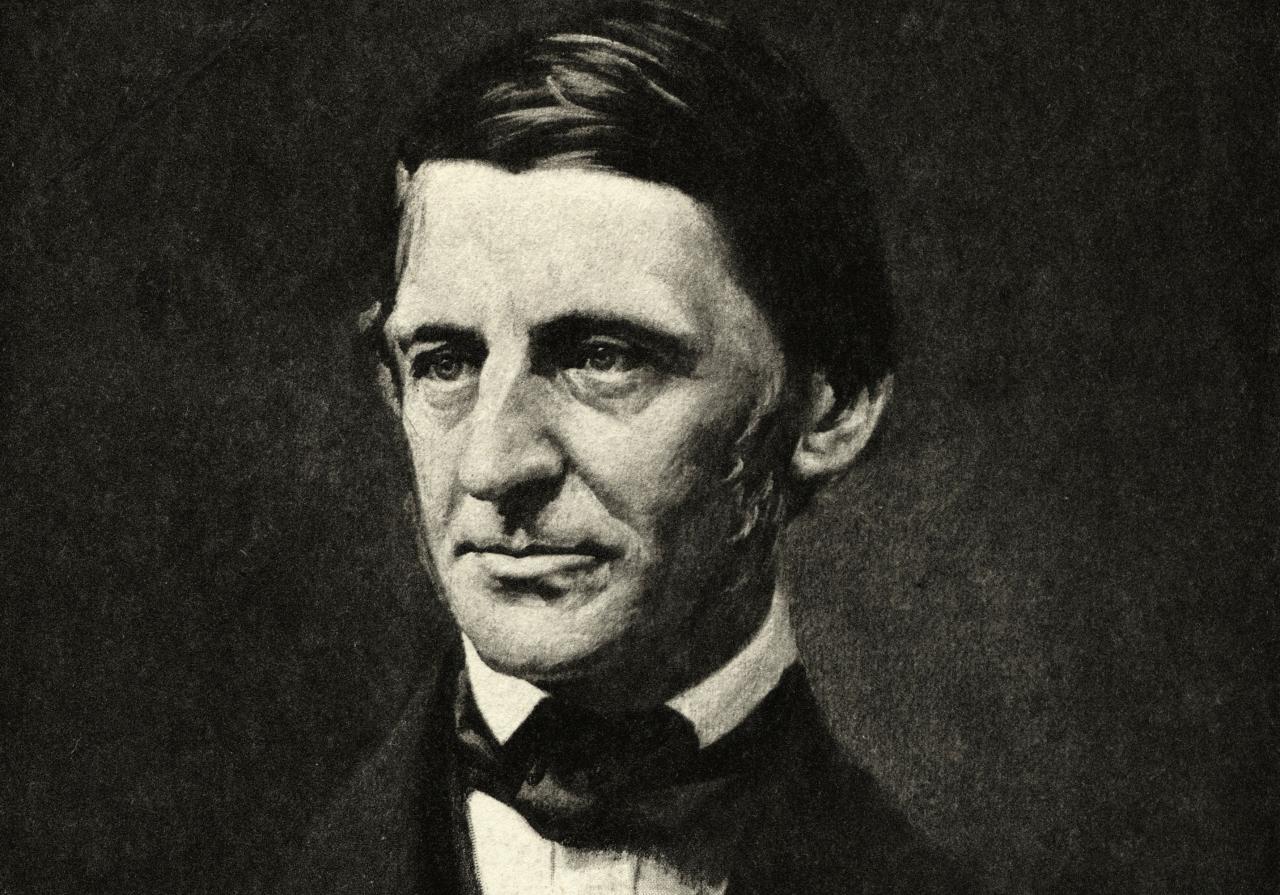Embark on a journey into the realm of ralph waldo emerson apush definition, where we unravel the profound ideas and enduring legacy of one of America’s most influential thinkers. Ralph Waldo Emerson, a towering figure in the Transcendentalist movement, left an indelible mark on American literature, philosophy, and national identity.
His writings, characterized by their eloquence, depth, and timeless wisdom, continue to inspire and challenge readers to this day.
Ralph Waldo Emerson’s Life and Background: Ralph Waldo Emerson Apush Definition

Ralph Waldo Emerson was born on May 25, 1803, in Boston, Massachusetts. His father, William Emerson, was a Unitarian minister, and his mother, Ruth Haskins Emerson, was a devout Christian. Emerson’s early education was at the Boston Latin School, where he excelled in his studies.
He then attended Harvard College, graduating in 1821.
After graduating from Harvard, Emerson studied divinity at Harvard Divinity School. However, he soon abandoned his plans to become a minister, as he found himself unable to accept the orthodox Christian doctrines of the time. Instead, he turned to writing and lecturing as a way to express his own philosophical and religious views.
Intellectual and Cultural Influences, Ralph waldo emerson apush definition
Emerson’s thinking was shaped by a wide range of intellectual and cultural influences. These included the works of the English Romantic poets, the German Idealist philosophers, and the American Transcendentalist movement. Emerson was also deeply influenced by the writings of the ancient Greek philosophers, particularly Plato and Aristotle.
Emerson’s own philosophy was a complex and eclectic mix of idealism, individualism, and mysticism. He believed that the universe was fundamentally spiritual and that the individual was capable of achieving a direct and personal experience of the divine. He also believed that the individual was responsible for his or her own happiness and fulfillment.
Transcendentalism and American Identity

Transcendentalism, a philosophical and literary movement that emerged in the 19th century, was deeply influential on Ralph Waldo Emerson’s worldview and writings. Transcendentalists believed in the inherent goodness of humanity, the importance of intuition and experience over reason, and the interconnectedness of all living things.
Individualism
Emerson’s Transcendentalist beliefs led him to emphasize the importance of individualism. He argued that each person has a unique spark of divinity within them and should strive to live an authentic life, free from the constraints of society.
Nature
Transcendentalists also believed in the power of nature. Emerson saw nature as a source of inspiration, wisdom, and spiritual connection. He believed that by spending time in nature, individuals could transcend the limitations of their everyday lives and experience a deeper understanding of themselves and the world around them.
Intuition
Emerson placed great value on intuition and experience over reason and logic. He believed that true knowledge comes from within, through the intuitive faculty of the soul. He argued that by trusting our inner voice, we can access a deeper understanding of the world and make better decisions.
American Identity
Emerson’s writings played a significant role in the development of a distinct American identity. His emphasis on individualism, self-reliance, and the importance of nature resonated with many Americans who were seeking to define themselves as a new nation.
Major Works and Ideas

Emerson’s writings profoundly influenced American literature and thought. His major works include:
- Nature (1836):Explores the relationship between humanity and the natural world, emphasizing the importance of intuition and experience over reason and tradition.
- Essays: First Series (1841):A collection of essays that explore a wide range of topics, including self-reliance, individualism, and the importance of nonconformity.
- Essays: Second Series (1844):Continues the themes of the first series, with a particular focus on the role of the individual in society and the pursuit of truth.
Emerson’s central ideas include:
- Transcendentalism:The belief that the universe is fundamentally spiritual and that humans have an intuitive connection to the divine.
- Self-reliance:The importance of individuals trusting their own judgment and intuition, rather than relying on external authorities.
- Nonconformity:The value of thinking independently and challenging established norms and traditions.
Legacy and Influence

Ralph Waldo Emerson’s ideas and writings have had a profound and lasting impact on American thought and culture. His emphasis on individualism, self-reliance, and the importance of intuition and experience resonated deeply with his contemporaries and continues to inspire thinkers and activists today.
Emerson’s philosophy has influenced subsequent generations of writers, including Henry David Thoreau, Walt Whitman, and Emily Dickinson. His ideas about the importance of nature and the interconnectedness of all things have also been influential in the development of environmentalism and the New Age movement.
Emerson’s Influence on American Identity
Emerson’s writings helped to shape the American identity in several ways. First, he emphasized the importance of individual self-reliance and the need to break free from the constraints of tradition and authority. This message resonated with Americans who were seeking to create a new society based on the principles of liberty and equality.
Second, Emerson’s writings helped to define the American relationship with nature. He saw nature as a source of inspiration and spiritual renewal, and he encouraged Americans to embrace the beauty and wonder of the natural world.
Emerson’s Ideas in Contemporary Society
Emerson’s ideas continue to resonate in contemporary society in a number of ways. His emphasis on the importance of self-reliance and individualism is reflected in the American ethos of self-sufficiency and personal responsibility.
His writings on the importance of nature and the interconnectedness of all things have also been influential in the development of environmentalism and the New Age movement.
Helpful Answers
What is the central tenet of Emerson’s Transcendentalism?
Emerson believed in the inherent goodness of nature and the divinity within each individual. He emphasized the importance of intuition and self-reliance over external authority.
How did Emerson’s writings contribute to the development of American identity?
Emerson’s writings celebrated the uniqueness and potential of the American spirit. He encouraged Americans to embrace their own experiences and values, rather than blindly following European traditions.
What is the significance of Emerson’s essay “Nature”?
“Nature” is a seminal work in American literature that explores the relationship between humanity and the natural world. Emerson argues that nature is a source of divine inspiration and that humans should live in harmony with it.
